Book News Roundup: All the books President Obama recommended
Capitol Hill Seattle this morning published a post on the Queer Resurgence on Capitol Hill Poetry Slam Festival, which happens this weekend. Check out the lineup of readers here.
If you missed Tuesday night's event at the central branch of the Seattle Public Library, in which Mattilda Bernstein Sycamore interviewed Sarah Schulman, author of Conflict Is Not Abuse, a video of the event is now available on YouTube:
- Young booksellers from around the country, including a few in Seattle, are launching Indies Forward, which Sydney Jarrard at Bookselling This Week calls "a new volunteer organization dedicated to cultivating, supporting, and sustaining the emerging generation of innovators and leaders in the bookselling industry." Jarrard continues:
Indies Forward, which will focus primarily on development, networking, and mentorship, will provide educational programming specifically tailored to new and emerging booksellers, on such topics as personal finance, management, and the economics of bookstores and publishing. The group plans to set up standalone networking events as well as in conjunction with regular industry gatherings so that younger booksellers will have a greater chance of being able to attend.
PEN America just announced their literary awards finalists for the year. It's an impressive array of authors, including Teju Cole, Colson Whitehead, Yaa Gyasi, and Helen Oyeyemi.
And the National Book Critics Circle finalists have been announced. The fiction prize is a face-off between heavyweights: Zadie Smith, Michael Chabon, Ann Patchett, Louise Erdrich, and Adam Haslett. Also, Margaret Atwood is getting a lifetime achievement award.
Entertainment Weekly has collected every book President Obama ever recommended.
Thursday Comics Hangover: Snow day
Not everyone realizes this, but every single comics store in the United States uses the exact same distributor: Diamond Comics Distributors. The collected graphic novels can be purchased directly through the publishers or through book distributors, but if you want to sell the staple-bound monthly so-called "floppies," you have to go through Diamond. There is no alternative. Diamond's last competitor, a distributor called Heroes World, was bought by Marvel Comics and then collapsed in the mid-1990s.
I bring this up because while Seattle is wet and relatively warm this week, we are surrounded on all sides by a horrifying snowscape. And the Diamond truck — the truck that carries every single comic headed to Seattle this week — can't get through the Pass. This means that no comic book store in Seattle had new comics yesterday.
It's really kind of batshit, if you think about it for a moment. If Diamond were to unexpectedly go out of business tomorrow, every comic book store in the country would be strangled for product. Dozens of shops would likely collapse within days, if not weeks, of Diamond's hypothetical closure.
Happily, while Diamond holds a monopoly on monthly comics distribution, they're not the only way for customers to get comics anymore. You can download them on your digital devices — although Comixology, the industry leader for digital comics, was bought by Amazon a while back, so you're basically trading one monopoly for another — and you can buy collected editions at your local independent bookstore. But it is very uncomfortable that all these hardworking small business owners in Seattle, many of whom have been in business for years, are reliant on one single truck making its way across a snowy mountain pass. There has to be a better model than this, is what I'm saying.
UPDATE 1/19/2017 at 1:14 pm: On Facebook, Short Run offers a terrific suggestion for a substitution for your weekly comics:
Visit Fantagraphics Bookstore and Gallery, Phoenix Comics and Games, Zanadu Comics, Elliott Bay Book Company, Left Bank Books Collective, and check out their LOCAL section.
"I like reading books."
On Snapchat, two reporters for brand-new news start-up Axios, Mike Allen and Jim Vandehai, interviewed President-elect Trump about his favorite books. The resulting exchange is reminiscent of Sarah Palin's most famous interview.
...what books are on your nightstand, or what's a book —
Well, you can see some of them over there. You can see some of them right over here. This is one that I just —
Which should we read? Should we read it?
No, I wouldn't say. I mean — [Laughter] It depends on whether you want to read it. This is one. It's very good.
Is there one you actually like that you'd recommend?
I like a lot of books. I like reading books. I don't have time to read very much now in terms of the books, but I like reading them. This one is just one that just came out. CNN. The CNN book just came out. I hear it's doing well.
You're plugging CNN, Mr. President-elect?
No, I'm not, actually, they just sent me those two books. I just got them. These are two books that are good: this one and this one. That one, you know.
Yet again, the distance between Trump and President Obama feels like an insurmountable chasm. Obama is a reader and a writer. Donald Trump doesn't seem to read books at all. He famously has said that he doesn't like to read reports or memos if they go over two or three pages. It is time to come to terms with the fact that our incoming president simply doesn't seem to enjoy reading.
Your Week in Readings: The best literary events from January 18th - January 24th
Wednesday January 18th: WordsWest 22
West Seattle’s liveliest reading series begins 2017 with Hugo House Writer-in-Residence Anastacia Renee Tolbert and Seattle Times reporter Claudia Rowe, whose brand-new true crime book The Spider and the Fly tells the true story of her correspondence with a serial killer. The two writers will read on the theme of “dreams deferred.” C&P Coffee Co., 5612 California Ave. SW, http://wordswestliterary.weebly.com. Free. All ages. 7 p.m.Thursday January 19th: A Word for Love Reading
Visiting author Emily Robbins’s debut novelA Word for Love is about an exchange student who travels to Syria, falls in love with the language, and then falls in love with a Syrian. Robbins, who studied in Syria on a Fulbright Fellowship, will likely have some things to say about the intersection of fiction and nonfiction. Elliott Bay Book Company, 1521 10th Ave, 624-6600, http://elliottbaybook.com . Free. All ages. 7 p.m.Friday January 20th: Occupy Inauguration
Technically this isn’t a reading, but the truth is, the We Defy event with Sherman Alexie and Ijeoma Oluo at Town Hall tonight is already sold out (though they do often have standby tickets at the door if you feel like waiting in line) and tonight is a night for political action. Go be heard. Westlake Park, 401 Pine St., http://www.seattle.gov/parks/find/parks/westlake-park Free. 5 p.m.Saturday January 21st: Bushwick Book Club
See our Event of the Week Column for more details. Town Hall Seattle, 1119 8th Ave., 652-4255, townhallseattle.org. $5. All ages 8 p.m.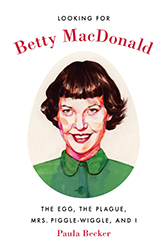
Sunday January 22nd: Looking for Betty MacDonald Reading
Betty MacDonald’s 1945 memoir about life on the Olympic Peninsula, The Egg and I, is an underappreciated Northwest classic. Seattle-area historian Paula Becker celebrates the UW Press’s republication of three long out-of-print books by MacDonald with a reading from her book which celebrates MacDonald’s history and legacy. Elliott Bay Book Company, 1521 10th Ave, 624-6600, elliottbaybook.com . Free. All ages. 7 p.m.Monday January 23rd: The Revolution Where You Live Reading
Author Sarah van Gelder is a co-founder of the Bainbridge Island-based Yes! Magazine. Today, she debuts her new book, The Revolution Where You Live: Stories from a 12,000 Mile Journey Through a New America. Hopefully, she has some ideas for a new form of activism. Lord knows we need it. Elliott Bay Book Company, 1521 10th Ave, 624-6600, elliottbaybook.com . Free. All ages. 7 p.m.Tuesday January 24th: This Is How It Always Is Reading
No less a towering talent than the Northwest’s own Ruth Ozeki praises Seattle author Laurie Frankel’s third novel, This Is How It Always Is, for charging us “to look beyond the traditional binary oppositions of boy vs. girl, right vs. wrong, real vs. make-believe, and to find courage and beauty in the in-between.” Elliott Bay Book Company, 1521 10th Ave, 624-6600, elliottbaybook.com . Free. All ages. 7 p.m.I told you about the Brooklyn-based comics magazine Resist!, which features anti-Trump comics by cartoonists from Seattle and around the country.
It's time for the comics to hit the streets. Do you want a copy? Bleeding Cool listed the places where you can pick up Resist! this weekend. The Seattle-area locations are, in alphabetical order:
Go pick up your Resist!s this weekend (and don't forget to buy a comic or two when you do.)
Literary Event of the Week: Bushwick Book Club and Seattle7Writers at Town Hall
Seattle’s edition of the Bushwick Book Club is named after a popular Brooklyn series in which musicians write original music in response to a popular work of literature. Since 2010, local singer/songwriters and bands have been gathering at venues ranging from the Century Ballroom to Town Hall Seattle to the Can Can to sing songs about books including Slaughterhouse-Five, The Dark Knight Returns, and Silent Spring.
The Bushwick Book Club works best if you’re familiar with the books that the artists are singing about, of course, but even without a working knowledge of, say, Pride and Prejudice, you’ll still enjoy a nice little live anthology of Seattle-area musicians. They take turns singing a song or two each, and by the time you leave the venue at the end of the night, you’ll realize you heard an astonishing variety of music: country, folk, rock, hip-hop.
There’s something to be said for live musicians collaborating with dead authors — it’s fun to imagine Hunter S. Thompson’s annoyed response to a song that completely misses the point of Fear and Loathing in Las Vegas, for instance — but Bushwick Book Club also brings together Seattle authors with musicians in a kind of artistic exchange program. This Saturday at Town Hall, the Book Club collaborates with local writers’ organization Seattle7Writers to create music in response to water-themed passages from their books
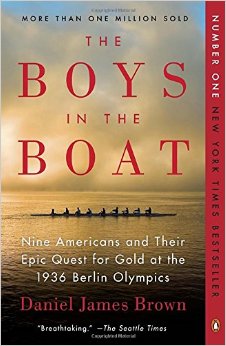
Contributing authors include Daniel James Brown (whose UW rowing team history The Boys in the Boat became one of the unlikeliest Seattle-area bestsellers on its release four years ago,) Jennie Shortridge (author of the novels Love Water Memory and When She Flew,) and Jim Lynch (author of the excellent giant-squid novel The Highest Tide and the so-so Seattle World’s Fair novel Truth Like the Sun.) Musicians include Julia Massey, Joy Mills, Reggie Garrett, and Ben Mish.
Additionally, singer/songwriters Wes Weddell and Annie Jantzer, both of whom have been performing with the Book Club since the very beginning, will be performing. These two Bushwick veterans are consistently the most fun performers to watch. These aren’t novelty tunes dashed off on a toy xylophone. The two always provide a thoughtful reading of the book, and their songs are always heartfelt and well-constructed.
As anyone who’s ever watched a movie version of a beloved book can tell you, the art of adaptation is always, at best, imperfect. But the thing that saves Bushwick Book Club from awkwardness is the inclusion of literary criticism. The songwriters aren’t just relating plots in verse-chorus-verse format; they’re sharing their reading experiences, their understanding of the texts. That little bit of biography, of confession, of review is what elevates Bushwick from adaptation to conversation — and from conversation to art.
Writers: time to go back to school

Our sponsor Mineral School is in the midst of receiving applications for their 2017 fellowships. Let's see if any of these describe you: an early or mid-career writer of fiction, non-fiction, or poetry? A writing parent of a child under 18? A visual artist? There are residencies for you, spanning from full subsidized one-week stays, to two week residencies for the remarkable price of $425.
Oh, and they feed you. And have visiting writers come through. And you live in an old schoolhouse in Mineral Washington, a lakeside town with a sterling view of Mount Rainier. It's a totally unique, wonderful, and productive way to hunker down and focus on writing, and writing alone. On our sponsor's page, see what Washington State Poet Laureate Tod Marshall write about his stay at Mineral School.
Want to know more? Mineral School will be appearing on January 29th, with Hugo House, and others, at the Seattle Public Library in a session called "Residencies Revealed: Writers and Programmers Tell All".
Sponsors like Mineral School make the Seattle Review of Books possible. Did you know you could sponsor us, as well? Get your stories, or novel, or event in front of our passionate audience. We only have two dates left in our current block. Take a glance at our sponsorship information page for dates and details.
Here is a movie to remind you why you love reading and writing
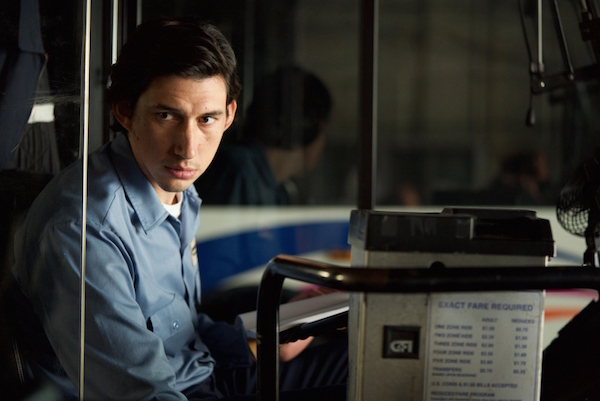
A lot of great movies adapted from written works have been released over the last month or so. Silence is a complex and challenging and ultimately rewarding adaptation of Shusaku Endo’s novel about the demands and responsibilities of faith. Fences is one of the most harrowing family dramas I’ve seen in years, with career-best performances from Denzel Washington and, especially, Viola Davis.
But one original movie in theaters right now, not adapted from a book or play, is a surprising tribute to the importance of the written word. I’m talking about Jim Jarmusch’s new film Paterson, and I’m telling you: if you love books and poetry and writing, you have to see this movie as soon as possible.
Paterson’s premise sounds like the setup for a limerick: Adam Driver stars as Paterson, a bus driver in Paterson, New Jersey. The film follows a week in his life, and not a whole lot, really, happens. Paterson is a man who likes his rituals: he walks the dog to the bar every night, and he writes a few lines of poetry into his notebook in the morning, and he likes to sit in the same spot and watch the water go over Paterson Falls. He and his girlfriend Laura (Golshifteh Farahani) live a quiet life that is mostly content. They could use a little more money, sure, but who couldn’t?
Paterson is a film of echoes. Certain themes repeat themselves over and over: fire, twins, rain. Paterson admires the poetry of William Carlos Williams, the city of Paterson’s most famous literary resident, and Williams’ work reverberates through the film as well. (Williams wrote an epic poem about the city also titled Paterson.) These little instances accrue into a fuller portrait, a pointillist masterpiece.
Paterson doesn’t write his poetry for the sake of immortality. He writes poetry because it’s how he processes the world. Driver reads the lines over and over in a halting voice as Paterson writes in his notebook and the handwritten words appear on screen. We see him sitting in his small office, lined with books by Williams and David Foster Wallace and Frank O’Hara, as he struggles to get the words just so. He seems to meet poets around every street corner: everyone is recording the universe in careful handwriting on lined paper in secret notebooks.
Paterson made me happier than any movie I’ve seen in recent memory. It’s a movie about art for the sake of art, a movie about writing and reading for no reason but for the pleasure of writing and reading. Paterson’s life inspires his art, which in turn inspires his life. There’s probably no big break around the corner for him. He’s probably not going to get a big thick hardcover anthology of his work. But he does it anyway, because he has to, and because it makes him better.
Trust me: you don’t want to half-watch Paterson on your couch while idly flicking through your phone. This is a movie to watch in the theater. Afterward, take public transit home. Bring a book of poetry to read on the bus or the train. Eavesdrop on some conversations. There’s art everywhere — you just have to be ready to receive it.
If you haven't yet read Michiko Kakutani's incredible interview with President Obama about his reading and writing life, you're really missing out.
Tips for Surviving the Saw Franchise
The only way out is not through (bone).
When in doubt, don’t just meat or martyr.Before cutting off your hand to spite your captor, see if you can tip the jar.
Sometimes, shoot it; when you do, aim for the gears.If there aren’t any scissors, start a fire. If there’s room in the well, sardine.
Not every number is an incision, and not every rule is a law.
The people who call you imprisoned are begging dilemma, so recognize
when dismantling traps requires you to think like a needle
and when you’d be better off thread.Think outside the bear trap: Cinderella would smash her glass slipper
and birdsong a key from the shards; James Bond martini a fast car
from razor wire and the last olive. Joan of Arc would put on the wrong clothes,
take her own advice, call it God; there’s an exit for you. I promise.
On the future of Seattle Writers Resist: "Our values are under attack in a very real way."

In the days after the election of Donald Trump, poet Erin Belieu called on Facebook for writers and readers to not give in to despair and to “actively help make the world we want to live in.” Her appeal quickly went viral, evolving into a series of nearly 80 coordinated readings around the world on Sunday January 15th. Those readings are the launch of an organization called Writers Resist. I talked with the organizers of Seattle’s Town Hall event, journalist Kristen Millares Young and novelist Sam Ligon, about their work creating the Seattle faction of Writers Resist.
So what, exactly, is Writers Resist?
Kristen Millares Young: Writers Resist is a national movement with international allies to further the cause of a just and compassionate democracy.
Sam Ligon: It's made up of local organizations that are expressing their ideals. And in the case of Seattle Writers Resist, we're interested in celebrating free speech and the American ideals of freedom and equality.
What local organizations are you working with?
KMY: First and foremost, we're working with Town Hall Seattle as a partner and a venue. Our first nonprofit that we're helping to rally support for is the ACLU of Washington.
SL: The reason we think it's important to support the ACLU and free speech is because as writers, that's what we deal in — we deal in speech. And it's our duty and obligation to exercise the right of free speech and to celebrate free speech.
KMY: There are Writers Resist events around Washington state: Bellingham, Ellensburg, Spokane, Olympia, Bainbridge Island, and Port Townsend. And each one of these events has a different social justice issue as a rallying cause. Each city is taking a different approach to their idea of what's needed for democracy to function.
SL: Ellensburg is particularly interested in immigrant rights, for example, so location is determining focus.
Why is free speech the focus in Seattle?
KMY: I think Seattle as a city needs to have a voice in the future of our nation, and it’s important that we exercise and celebrate our right to be known despite our progressive values not being in power at the moment. We as a city have a responsibility to our nation to hold these things up and keep them visible until our elected representatives see fit to celebrate them along with us.
SL: I also think in Seattle we have an incredibly rich and diverse literary community. We've got a wealth of voices in this town to speak and we want to bring those voices into play.
What is the future of Writers Resist?
KMY: I see Writers Resist keeping our community engaged in discussing civic ideas, and turning the conversation towards what we must sustain and preserve and champion. Our values are under attack in a very real way from the highest reaches of government, and as an organization, we're here to bring people together to remind them that we know what it is that makes America great.
SL: And we have an obligation to say something. You know the post-9/11 admonition to say something if you see something? We'd like to encourage writers to do that. We're all going to be seeing things — we all are seeing things — that require our speech, require us to comment upon them.
How do people get involved?
KMY: You can tweet at the national organizers. We are putting together a Facebook group. There are hashtags that people can use. One thing that people are doing is that on Fridays there is a #ReadersResist hashtag where people are finding inspirational quotes that celebrate ideals of democracy and sharing them to act as a pushback against this vitriol and empty condemnations.
We need to come at the world with something to offer, not just condemnation. We need to say, "these are the values that we believe in,” to remind people why that belief is so necessary. I think people are stirred by ideas, and so we want to stir people and to do what they can during this time.
Thanks to these Writers Resist events happening all over the world, there are about two thousand people, two thousand writers, two thousand communicators, two thousand teachers of all kinds who are now in contact with each other who weren't before. What I'm seeing happen is we've opened up communication, so that if someone has a great idea it can rise to notice quickly and be implemented.
It’s about the idea of bringing people together for teach-ins and having open channels of communication. [Those channels] essentially have been closed down as people are keeping themselves to their smaller networks and withdrawing from the horror of every day's news. We're bringing people back to that table and saying “no, there's things we can do here that are positive. It's not just feeling battered by each day. There's something we have to do.”
SL: We want an alternative to despair. Despair is not the answer right now, nor is silence. People say, "what do writers resist?" Each local organization will determine that, but we think writers resist despair. Writers resist silence. We see this as the beginning of a conversation locally, regionally, that we hope to continue. And we hope this evolves into a larger, richer discussion.
KMY: We don't know how people are going to respond to this. One thing we suggested they could do would be to bring these ideals into their book clubs. It doesn't necessarily have to be a Writers Resist-themed thing, but if people in book clubs say "we're going to be reading writings on freedom, writings on equality,” they’ll be encouraging people who are already talking to each other to discuss things that are important to our democracy.
SL: We’re already rallying support to places like the ACLU that's a national organziation. Going forward, we want to support local organizations like Northwest Immigrant Rights Project.
KMY: Here in Washington state, we have a state legislator who proposed to categorize peaceful protest as economic terrorism. That's not going to fly, but at the same time, it’s important to say that we condemn that, that this is wrong. There are things we need to do to raise up the values that we want to see. If we don't do it, who will?
SL: We want to make America great again, is what we're saying.
The Sunday Post for January 15, 2017
How Albert Woodfox survived solitary
One week after joining the Black Panthers, Alfred Woodfox was arrested for robbery. Implicated in the murder of a prison guard, he spent 41 years in solitary confinement, longer than any American in history. His story, documented by Rachel Aviv, is one of extraordinary strength of mind — and the willful persistence of independence despite unbelievable social and physical constraints.
On February 19, 2016, his sixty-ninth birthday, Woodfox packed his belongings into garbage bags and put about a hundred letters in a cardboard box. He put on black slacks and a black bomber jacket that a freed Angola prisoner had sent him.
Not until he was outside did he believe that he was actually going to be freed. It was a warm, clear, sunny day. He squinted and held the hem of his jacket. When he reached the front gate, he raised his fist and gave a closed-lip smile to a small crowd of supporters.
Michael led him to his car, a blue Corvette. Woodfox shuffled when he walked, as if shackles still connected his feet. Biting his lip and crying, Michael helped his brother into the passenger seat and showed him how to fasten the seat belt.
How ‘Sherlock of the library’ cracked the case of Shakespeare’s identity
Robert McCrum has a delightfully bookish profile of Heather Wolfe, whose contribution to Shakespeare scholarship should but probably will not close the age-old question of who wrote the most celebrated plays in the English language. Among her other work is “Project Dustbunny,” which analyzes hair, dust, and skin to trace the habits of 17th century readers. Dr. Wolfe, we are at your feet.
Dr Wolfe is a willowy, bright-eyed manuscript scholar, a paleographer specialising in Elizabethan England who in certain moods of candour might put you in mind of Portia or perhaps Cordelia. She’s also a Shakespeare detective who, last year, made the career-defining discovery that is going to transform our understanding of Shakespeare’s biography. In the simplest terms, Wolfe delivered the coup de grace to the wild-eyed army of conspiracy theorists, including Vanessa Redgrave and Derek Jacobi, who contest the authenticity, even the existence, of the playwright known to contemporaries as Master Will Shakespeare.
Richard Prince Just Showed Artists a Way to Fight Trump
Petty pleasure or genuine act of defiance, there’s something viscerally satisfying about Richard Prince’s decision to disown his own creation after its purchase by Jared Kushner and Ivanka Trump. Prince has been called a flim-flam man and worse for selling art based on images lifted from Instagram, but like the artists who have refused to perform at the inauguration on January 20 — and unlike Silicon Valley’s tech elite — he’s hitting Trump in the only place that seems to hurt: the president-elect’s delicate ego.
Jerry Saltz on learning to fight on a new cultural and political battlefield.
Even if this en masse disowning is only an isolated action, limited to those artists lucky enough to live off their work, just a drip in the middle of this building shitstorm of a presidency, I gleaned an artist trying to take back his name, his work, do something, anything. To do this in a time that is calling to us all to take action rather than to simply default, using our energies to criticize how others use their energy.
Prince's act of disownership opens up an incredible window of resistance.
A message to my doomed colleagues in the American media
In the wake of Donald Trump’s first press conference as president-elect, a cautionary tale for American media from Russian journalist Alexey Kovalev.
This man owns you. He understands perfectly well that he is the news. You can’t ignore him. You’re always playing by his rules — which he can change at any time without any notice ... Your readership is dwindling because ad budgets are shrinking — while his ratings are soaring, and if you want to keep your publication afloat, you’ll have to report on everything that man says as soon as he says it, without any analysis or fact-checking, because 1) his fans will not care if he lies to their faces; 2) while you’re busy picking his lies apart, he’ll spit out another mountain of bullshit and you’ll be buried under it.
How I Got My Attention Back
If you can set aside the irony of yet another online essay railing against the Internet — which is gutting our attention spans, killing our ability to experience the sublime, and probably kicks puppies when nobody’s looking — Craig Mod has some good reminders about what happens when we turn on the content spigot and why we should occasionally turn it off.
Today, I could live on Twitter all day, everyday, convincing myself I was being productive. Or, at least inducing the chemicals in the mind that make me feel like I’m being productive. Read more news. Send more replies. Start more threads. Each incoming reply activating a corresponding dopamine pop. Largely pushing nothing in the world forward.
Maybe I lost my attention because I’m weak, lonely, pathetic. Maybe everyone else has total control; they can resist all the information spun by algorithms — all the delicious dopamine hits in the form of red circles. Bing! Maybe it’s just me.
But … I want my attention back.
Seattle Writing Prompts: ghosts and fires
New column! Seattle Writing Prompts are intended to spark ideas for your writing, based on locations and stories of Seattle. Write something inspired by a prompt? Send it to us! We're looking to publish writing sparked by prompts.
The Butterworth Building is haunted. Just ask anybody who works at Kells, the Irish pub in the basement of the building.
Opening in 1903, purpose built as a mortuary for the firm Butterworth & Sons, it was likely the first building in the United States to provide full mortuary services under one roof. In fact, the grand man himself, Edgar Ray Butterworth, is credited with having coined the terms mortuary and mortician. So, take that, rest of the world who then adopted terms invented in Seattle. Tell all of your funeral-nerd friends!
Speaking of firsts, it was the first building on the west coast to have an elevator — although the 1st avenue face of the building is only three stories, if you walk around back to Post Alley, you'll find another two below them. Kells is in the former embalming room and crematorium, or the stables and storage for funeral wagons, depending on who you believe.
The building was in the news a few weeks back after catching fire, which is when I started reading about it. Isn't it funny how this little three-story wonder can have such a history? At the end of the post, I'll include a second shot from Flickr, when the building was an engineering firm in the 1960s.
If you search for information about the Butterworth Building, you will find many writings talking about how haunted it is.
All of which gives us some nice potentials for:
Today's prompts
- You're a bartender at Kells, and it's closing time. You just got the drunks out, and the last load of glasses put away, and the bar wiped down. The door — you swore it was locked — opens, and a man in black stands before you.
- You're a kid, eight years old, and you were chased out of the market after stealing an apple from a fruit-stand. You hide in the old mortuary stables, and you overhear the stable boy talking to a girl he fancies, and he tells her something that changes your life forever.
- You're a firefighter, and you enter a smoky room at the top of the building, wearing your respirator. You're making sure the place is clear of people. A buzzing sound and flickering light catch your attention. A device, metallic and round and decidedly futuristic catches your attention. You reach out for it...
- You work in the engineering firm on the ground floor, as a draftsmen. You're working on a piece, cigarette in mouth, when a cop walks in. Talks to your boss. You see the boss point at you. The officer removes his hat and walks towards you with a sympathetic look on his face.
- You're a construction worker excavating years of really crappy remodels inside the Butterworth building. You're working on this one part of wall, when you feel a loose brick. It wiggles free, and a blast of cold air hits your face. You put your flashlight up and look inside....
Book News Roundup: Of Whoppers and romance
- Jack Straw Cultural Center just announced their 2017 Jack Straw Writers authors. The program helps authors learn how to improve their performing skills, both in person and in recorded media. This year's Jack Straw writers were selected by poet Jourdan Imani Keith. They are:
afrose fatima ahmed, Quenton Baker, Jamaica Baldwin, Ellie Belew, Catalina Marie Cantú, Wancy Young Cho, Calvin Gimpelevich, Steph Kesey, Hera McLeod, D.A. Navoti, Ashlan Runyan, and Brandon Young.
Unlike 2016's crop of Jack Straw writers, which featured popular local names including EJ Koh, Robert Lashley, and Shin Yu Pai, 2017's list is mostly unknown to me. (The exception, of course, is Quenton Baker, who is having a phenomenal year including the publication of his first book.) You can learn more about these Jack Straw Writers at their annual reading series, which takes place on the first three Fridays in May.
Outgoing Seattle Times Books editor Mary Ann Gwinn reports on the winners of this year's Pacific Northwest Bookseller Awards. It would've been weird had Lindy West and Sherman Alexie not won these awards, to be honest. The big surprise on this list of winners is Portland author Kelly Sue DeConnick's comic book Bitch Planet, which is an exceptional book that falls outside the (generally very comfortable) profile of traditional PNBA winners. If you haven't read Bitch Planet yet, you should; I've written about it several times.
Seattle author Tara Atkinson has a terrific essay up at Hobart right now. It's about Burger King and heartbreak. Atkinson read an early version of this essay at the very first APRIL Festival's literary pub crawl while sitting in a little red wagon that was being pulled down Capitol Hill.
Speaking of local authors with connections to the APRIL Festival, you can find an excerpt from Richard Chiem's still-in-progress novel at Scramble right now. The opening line is pretty great: "Being able to handle rejection is sexy."
Fantagraphics would like you to know that Gilbert Hernandez saw all this coming thirty years ago:
I think @BetomessGilbert is a prophet. From Love & Rockets #17, 1986 pic.twitter.com/7Uq12qPggF
— Fantagraphics Books (@fantagraphics) January 12, 2017
...we, with the help of Savage Minds and the journals American Anthropologist, American Ethnologist, Cultural Anthropology, and Environment and Society are proposing a Read-In on January 20, 2017. We invite all anthropologists and others to come together to read Michel Foucault’s lecture eleven in “Society Must Be Defended” which he delivered on March 17, 1976. This lecture strikes us as very good to think with at this present point: it demands we simultaneously consider the interplay of sovereign power, discipline, biopolitics, and concepts of security, and race. In light of the current socio-political situation where the reaction to activism against persistent racism has been to more overtly perpetuate racism as political discourse, we need to remember and re-think the role of racism as central to, rather than incidental to, the political and economic activities of the state.
The Help Desk: What can writers do to fight Trump?
Every Friday, Cienna Madrid offers solutions to life’s most vexing literary problems. Do you need a book recommendation to send your worst cousin on her birthday? Is it okay to read erotica on public transit? Cienna can help. Send your questions to advice@seattlereviewofbooks.com.
Dear Cienna,
Some of my writer friends have gone off the deep end on Facebook, posting novel-length rants about the state of the country. It’s misplaced energy — they’re just dumping content into a void. I want to ask them to do something else with their time and energy, but a lot of them work multiple jobs already so volunteering is straight out and I know they don’t have any extra money to donate. Is there something that a writer can do to fight Trumpism that nobody else can? Preferably something that doesn’t involve Facebook?
Dan, Crown Hill
Dear Dan,
I understand your friends' need to vent. What was once a diverting sideshow in the freak tent at Barneby's Human Marvels, otherwise known as the Republican primary, has become another credentialed nightmare embodying America's worst impulses: racism, greed, serial narcissism.
The next four years will feel like a punishment for many people. It will be a punishment, and because life isn't fair, it will be shouldered primarily by those who are too demoralized, too poor, too busy feeding their families to fight back.
What would I recommend your writer friends do to combat the era of Trump? First, I would tell them to read this exhaustive Atlantic piece on the psychology of Donald Trump. The Andrew Jackson comparison gave me comfort that our country has weathered this brand of egomaniacal leadership before. Then I would ask them to stop ranting for a bit and take some time to do what writers do best – observe and record. Talk to people. When Trump and our Republican Congress implement new policies, find out how those policies affect their coworkers, family, friends, people in bars and on the bus. Write about that – even write about it on Facebook (sorry, I know that's not what you wanted to hear).
We need those records because this administration won't last anywhere close to forever; midterm elections are two short years away. Having those stories – not rants, but fact-driven anecdotes – will be important in proving the harm this Congress and president-elect have caused in our communities, and the people most vulnerable to harm often need help getting their stories out there.
That's my advice. My other advice is for you to host parties. The weather is taking a continual shit on our heads while the tannest man in the nation takes over the whitest house on the planet, and to top it all off many species of spider are in hibernation so my friend pool, at least, has been cut in half. Take care of your human friends: even the busy ones need to eat and everyone needs company at a time like this.
Kisses,
Cienna
Portrait Gallery: Elissa Washuta
Each week, Christine Marie Larsen creates a new portrait of an author for us. Have any favorites you’d love to see immortalized? Let us know

Sunday January 15th
Writers Resist: A Celebration of Free Speech
It seems impossible that this week will bring both the annual celebration of Martin Luther King, Jr. and Donald Trump’s inauguration. But here we are. To mentally prepare for the discord to come, why not attend this freedom-minded reading by writers from Bellingham (Robert Lashley) and Spokane (novelist Jess Walter, poet Tod Marshall) and Seattle (Elissa Washuta, Jane Wong, G. Willow Wilson)?
Town Hall Seattle, 1119 8th Ave., 652-4255, townhallseattle.org. $5. All ages. 7:30 p.m.
Tickets released for David Sedaris performances on Sunday

Good news if you were frustrated by entirely sold-out shows for David Sedaris' series of readings — Sponsor Northwest Associated Arts has informed us that tickets for both the matinee and evening show this Sunday, the 15th, have just been released. Act fast!
If you somehow miss snagging one of those, we've also been told that a small number of tickets will be available at the door for most performances. If you're deep Sedaris fan who wasn't able to grab tickets in time, you might want to give the box office a try right before the performances. You can also read more about all of this on our Sponsor's page.
We have released our new sponsorship dates! Sign-up to become a sponsor. Most dates from Feb — July are available, so snag yours while you can. We typically sell out, and it would be great to make sure you're in the calendar. It's the only guaranteed way to make sure your work gets in front of our audience.
The Future Alternative Past: this dystopian hope
Unreality show
Interviewers sometimes ask me which mode of science fiction is easier to write: Utopia or dystopia? Look around you, I answer. Dystopian fiction is basically mimetic (realistic) fiction. It’s way, way too sodding easy to depict a scenario so ubiquitous; I choose to get my jollies envisioning the Utopian coolness that could be.
Equality and perfection are two hallmarks of Utopias. Especially for members of non-dominant groups like myself — women, queers, racial minorities, etc. — the status quo has long been anything but egalitarian, and its operating methods far from perfection. Even able, cis, white, heterosexual, young, middle class males are having hard times lately, though. Or so I hear from friends who fit those default categories.
We haven’t always inhabited this particular nightmare, and for decades science fiction/fantasy/horror has produced cautionary tales which could have warned us away from it. Thus my unease at the rise of “reality shows,” those television programs, common since the beginning of the millennium, in which supposedly unscripted action features non-actor celebrities and unknowns. I first encountered mention of them in extrapolated futures I wanted no part of, like James Tiptree, Jr.’s short story “The Girl Who Was Plugged In,” and “Baby You Were Great” and “Ladies and Gentlemen, This Is Your Crisis,” both by Kate Wilhelm. Novels from William Gibson, Barry Malzberg, and John Brunner fleshed out the picture: corporate ownership of governments; 24/7 surveillance; a culture of jaded, passive cynics.
Now a reality show star has been elected President of the United States. Now I’m living in the sort of world I didn’t even like reading about. Now I want to know how to change life’s channel.
So of course, being me, I turn to the imaginary.
Of published work, the most optimistic science fiction/fantasy/horror written recently on the topic of elections is Malka Older’s Infomocracy, a June 2016 publication that leaps a couple of decades ahead to a time when “microdemocracies” — non-geographical communities of 100,000 citizens — cover the globe. While Older’s depiction of how such a system would work — and fail — if put in place is entertaining in a governance geek way, this novel gives no turn-by-turn guidance on getting where it shows us winding up.
More promising in terms of finding a way forward, perhaps, are a pair of projects only lately underway. Ben Winters, Philip K. Dick and Edgar award-winning author of Underground Airlines, is putting together a series of stories “contemplating the future of our nation and world during and after a Trump presidency.” Scheduled to start appearing in Slate Magazine on Inauguration Day, these stories will be set in the 2016 presidential election’s immediate aftermath. Judging by the list of authors participating, bitterness, irony, and parody will probably be mixed with inventive strategies of resistance.
One prominent name on the list is crime fiction writer Gary Phillips, who will also edit The Obama Inheritance, an anthology in which contributors “riff on any one of dozens of teabagger-alt right conspiracy theories.” Time-traveling John Birchish saboteurs intent on destroying the president’s birth certificate, Michele wielding Pam Grier-worthy kung fu skills, and scenarios even more psychedelic than these seed the book’s proposal. In audacity there is hope.
Couple of upcoming cons
Held February 3-5, Foolscap is a small, local convention that wants you to decide what it will consist of. Members plan the weekend’s programming at a Friday afternoon meeting, scheduling panels and discussions around set pieces such as an auction, a banquet, and writing workshops. Their first Guest of Honor was Octavia E. Butler, and 2017’s is Patricia Briggs, but this con’s website claims that “Everyone is interesting.” Come take advantage of this least hierarchical of fandom’s famously non-hierarchical communities. And bring your brain; quoting again from Foolscap’s website, “Ideas make the best toys.”
Radcon is a more conventional convention, so to speak. It features the usual panels, gaming rooms, film viewings, and masquerades. Idiosyncratic strengths include well-organized school visitation sessions for professional writers; a chill, rambly hallway scene with an upright piano providing mood music; and a rave-like dance party.
Recent books recently read
If SFFH’s Golden Age is 12, as some insist, the genre’s Golden Format is the short story. Just the right size for having adventures in, short stories allow authors and readers to experiment with settings, ideas, characters, styles, so forth, so on, without making us invest huge wads of wordage. And anthologies with unifying themes both inspire these experiments and bring them together, thus making it easy to compare the ways they work.
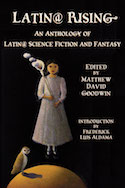
The editor of Latin@ Rising (Wings Press), Matthew David Goodwin,focuses on SFFH by US-connected Latinos/Latinas/Latinx writers. The closest comparable anthology is 2012’s Three Messages and a Warning, a book of new SFFH by modern Mexican authors. Though over a third of Goodwin’s selections are reprints, they’re of recent enough vintage that this book feels fresh and damp, as if the ink hadn’t yet made up its mind to dry. In particular I enjoyed the Klein bottlesque plot curvature of Kathleen Alcalá’s “The Road to Nyer” and Ernest Hogan’s far-too-relevant politipunk story “Flying under the Texas Radar with Paco and Los Freetails.”
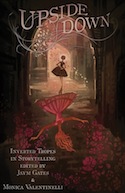
Paying less attention to source than content, Jaym Gates and Monica Valentinelli, co-editors of Upside Down (Apex), asked contributors to invert “tropes,” worn storytelling clichés such as “The black man dies first” (full disclosure: I have a story in this book based on that very cliché). Their directive results in surrealistic premises such as the trendy small-appliance bodymodding in Adam-Troy Castro’s “The Refrigerator in the Girlfriend.” But it’s also interesting to see how some authors subvert their chosen tropes rather than simply standing them on their heads, as when in “Those Who Leave,” Michael Choi’s Asian scientist is emotionally driven rather than a stereotypical personification of cold, passionless intellect. Plenty of pleasure of all kinds here, including deeply moving weirdness from Michael Matheson and Haralambi Markov. A section of essays by academics and writing professionals on tropes in general and certain toxically tempting ones in particular adds further depth to this already thought-provoking anthology.
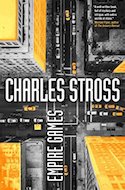
At the opposite end of the length spectrum from short stories lies the realm of the series — quartets, septologies, and the like. Charles Stross’s Merchant Prince series began, according to the late David Hartwell, as this notoriously “hard” SF-loving author’s attempt at writing fantasy. Sharing the multiverse premise and settings as well as several “worldwalking” characters with the Merchant Prince books, Empire Games (Tor) could be considered their seventh volume or, as it’s billed, the first of a related yet different series, the Paratime trilogy. Either way you read it, Stross’s latest will deliver vivid, unexpected, complicated fun.
Thursday Comics Hangover: Are you a Batman person or a Superman person?
I'm a Superman guy, not a Batman guy. Batman's fine — I've read plenty of Batman comics over the years — but ultimately Batman is about arrested development: any Batman story is basically a story of an emotionally stunted rich dude. There's only so much emotional wallowing you can do before you fall into parody. (I feel similarly about Trent Reznor: you can do a couple albums about the hurt in your soul, but after you make a couple critically acclaimed best-selling records, maybe you can afford a little therapy?) Will Arnett's portrayal of Batman from the 2014 Lego Movie spectacularly identified the character's ridiculousness, especially in this song:
Superman, on the other hand, is all about being an adult. I've written about what makes Superman an interesting character: internal conflict over complicated moral choices. Batman often can't withstand that kind of complexity.
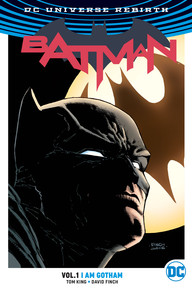
But DC Comics recently released paperback collections of the first six or so issues of the 2016 Batman and Superman series, and I'll be damned if these two characters haven't flipped in my estimation: Batman is the more interesting, more adult character and Superman is caught in a tar pit of adolescent melodrama.
Let's be clear: Batman Vol 1: I Am Gotham isn't a transcendant superhero comic. Hell, it's not even the best superhero comic from writer Tom King to be released in the last year (that would be King's amazing Vision series, which added layers of depth to a weird tertiary Marvel Comics character.) But it is a hell of a lot of fun, with Batman facing down a pirate, a crashing 747, and a pair of superpowered heroes who want to make Gotham City a better place.
I Am Gotham deals directly with Batman's perennial Superman envy by introducing a team of heroes with Superman's power set but very little real-world experience. Most of the book consists of Batman trying to figure out if he can trust them, and whether he's been outclassed as hero of the city. King's Batman seems to be growing and changing: he's aware of his own flaws and he's actively trying to overcome them.
David Finch's art is not my favorite: everything looks a little too pinched, and heroes look a little too constipated. But here, Finch allows for more depth, introducing characters with different body types. His facial expressions could still use some work — so much grimacing! — but it's nice to see an established fan-favorite artist take on greater depth and range.
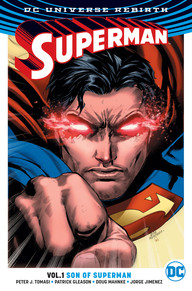
Speaking of depth and range, Superman Vol 1: Son of Superman delivers none. What a mess this comic is. It's unclear how much of this problem is due to writer Peter Tomasi and how much of it has to do with corporate edict. I can't even fully understand what's going on here.
So it seems that Superman is dead. But another Superman from a different timeline is seeking refuge in the dead Superman's timeline. This other Superman is married to Lois Lane (the one from his own timeline, not the one in the dead Superman's timeline) and has a child. This version of Superman is living in hiding, waiting for the dead Superman to come back to life. But eventually...
...oh, who cares? This book is just a bunch of flying and screaming and punching and angst, all signifying exactly nothing. It's too bad, too, because artist Doug Mahnke is one of the better Superman artists of our time: he can draw pretty much anything well: super-fights and morose graveside scenes and optimistic faces. But this story is all over the place, and not even Mahnke's remarkably solid art can provide a sense of consistency.
The one thing that Son of Superman does right is that it provides a great vision of Superman as a parent. His son with Lois, Jonathan, is basically a carbon copy of himself, only more reckless and more uncertain. This new character adds a new twist to the Superman formula: not only does he have to save the world, he has to raise a son while he's doing it. Being a parent makes Superman even more interesting. Too bad everything else about this Superman comic is so damn boring.





